Following the previous post was about last year’s UK Search winners, today we want to focus on domains that have lost significant Google visibility in 2020.
Organic rankings are a zero-sum game; If a domain wins positions, another domain has to submit rankings. After looking at the biggest UK visibility gains of the past year last week, today we’re talking about the SEO losers of 2020.
Again, based on the SISTRIX Visibility Index from the end of 2019 and the end of 2020, we determined the 250 domains that (both in absolute and percentage terms) lost the most visibility in Google UK search results during this period.
You can see the complete lists and tables with all domains at the end of this article. Before that we take a look at significant SEO losses of the past year. These examples show you possible dangers and risks. In each case, consider whether it could also apply to your projects.
Reference domains
There’s a lot of space for informative URLs in Google search and some of the most visible domains in the world focus directly on reference content. There was a lot of movement here in the last 12 months.
The total losses for the 11 reference domains shown in the top 25 amount to over 2300 visibility points including a big loss of 1034 Visibility Index points from wikipedia.org For reference, the second biggest domain in UK search, amazon.co.uk, has 2158 VI points and the number 1 news media site, guardian.co.uk, has 478 VI points at the time of writing.
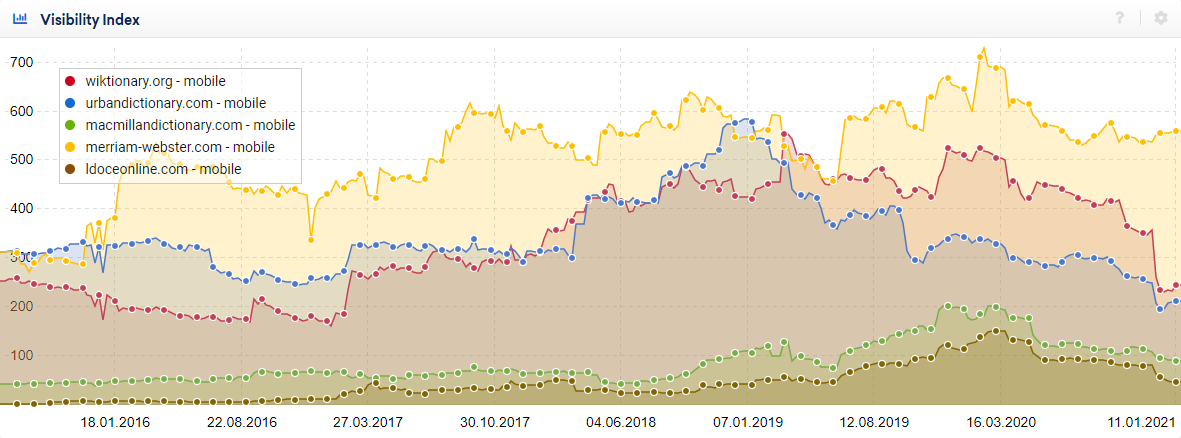
The dictionaries and wiki pages are obvious. But there are other domains which are losing their reference status. Spotify is one. While the brand is known for a streaming music service, the domain ranks for band, album and track information – purely informative reference material. It’s down 92 VI points this year.
Some classic reference sites have gained and dictionary.com is a good example but the gains can also be seen in less obvious and slightly more focused reference content.
britishmuseum.org and gemsociety.org, for example are niche but authoritative informational websites that gained. Others are not so obvious. freshbooks.com offer a SaaS accounting service but their website visibility is built on informative content rankings. They grew strongly this year based on that content.
There’s no conclusive evidence that reference rankings are being won by niche experts but the fact that large generic reference domains have been re-evaluated is a significant signal for SEO content projects.
11 of the top 25 domains with the biggest absolute losses in 2020 are reference sites.
News domains
News media domains were the second biggest category of domains by content type that lost organic search visibility in 2020.
6 news domains appear in the top 25 list of absolute losses. Looking across a list of 30 news media websites shows 28 domains lost a total of over 1000 Visibility Index points. Only 2 news domains on the list gained: manchestereveningnews.co.uk, a local newspaper with a strong reference content subdirectory and dailystar.co.uk, which is arguably an entertainment site.
Here are the top 4 absolute losses by news media sites in 2020.
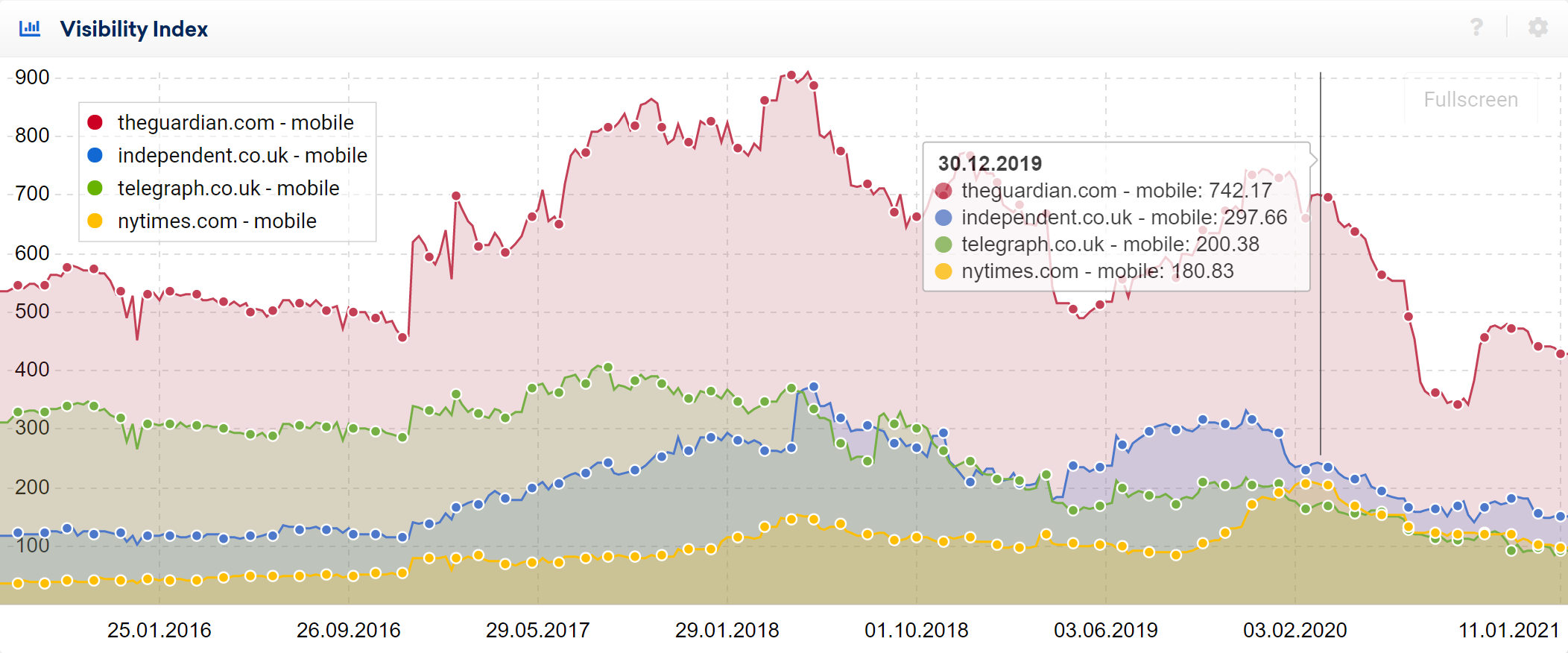
Where did the losses go?
By analysing some of the organic result losses we can start to build a picture of the types of domains that gained rankings from news domain losses in 2020.
Using features available within the Toolbox we analysed the current SERPs for the lost keywords on theguardian.com and generated a list of domains that are now ranking for these keywords.
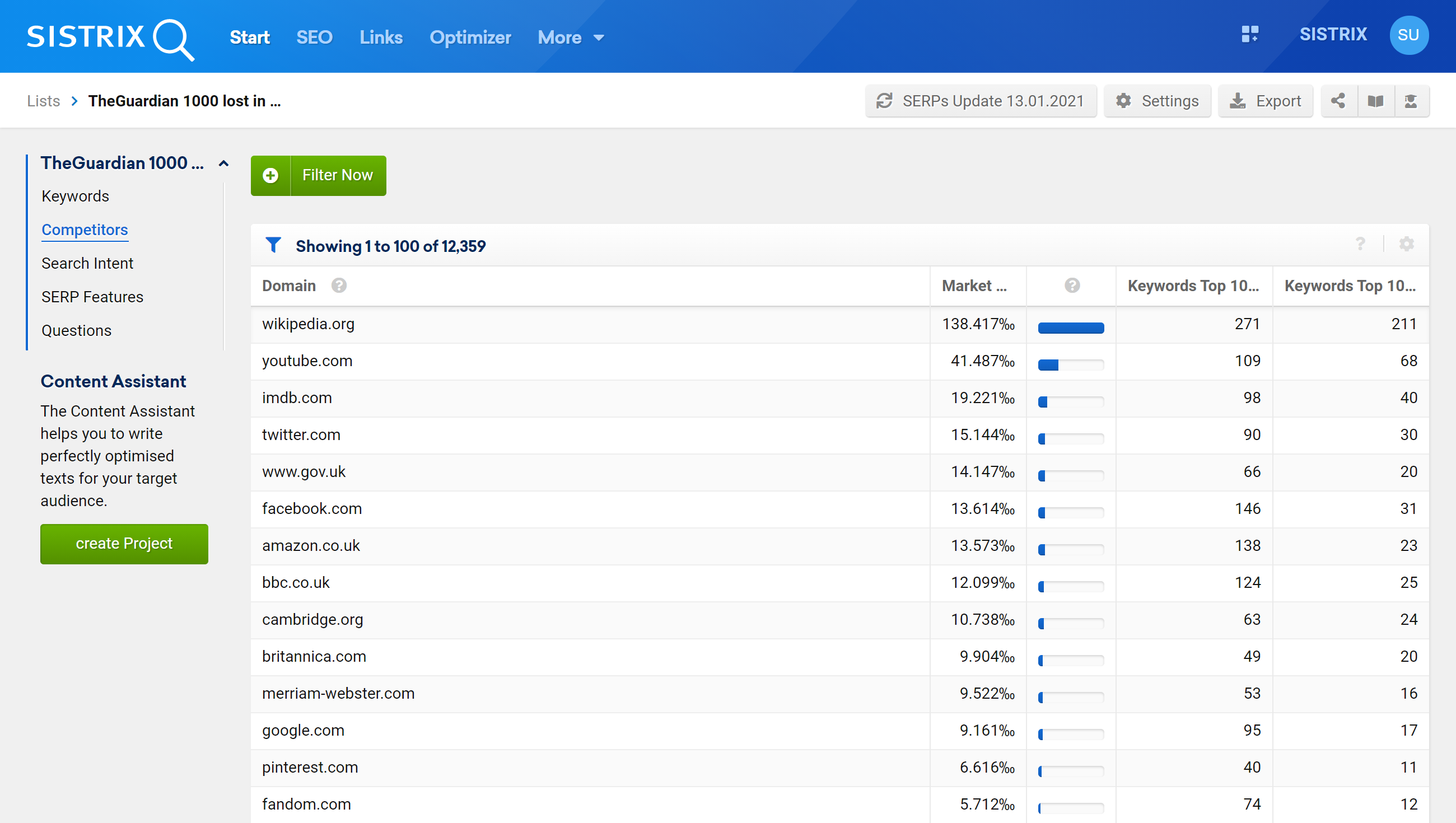
In this example, the bulk of the visibility is taken over by specialist media sites, social media and reference sites. Only 7 news domains were ranking among the top 100 domains.
The lesson to learn here is that the user intent served by the results is being optimised and updated by Google. When these changes happen, other URLs might find their way into search results, and there’s not much you can do about it.
‘Best’ sites
Using the affiliate revenue model, many product sites have positioned themselves as ‘best’ review and comparison sites. In 2020 there are a number of these sites on the losing side.
Losing domains include bestofmachinery.com, improb.com, carbibles.com, gearhungry.co, bestadvisers.co.uk and, hidden behind a domain move but revealed here in a composite graphic, thewirecutter.com content which New York Times paid $30m for in 2016.
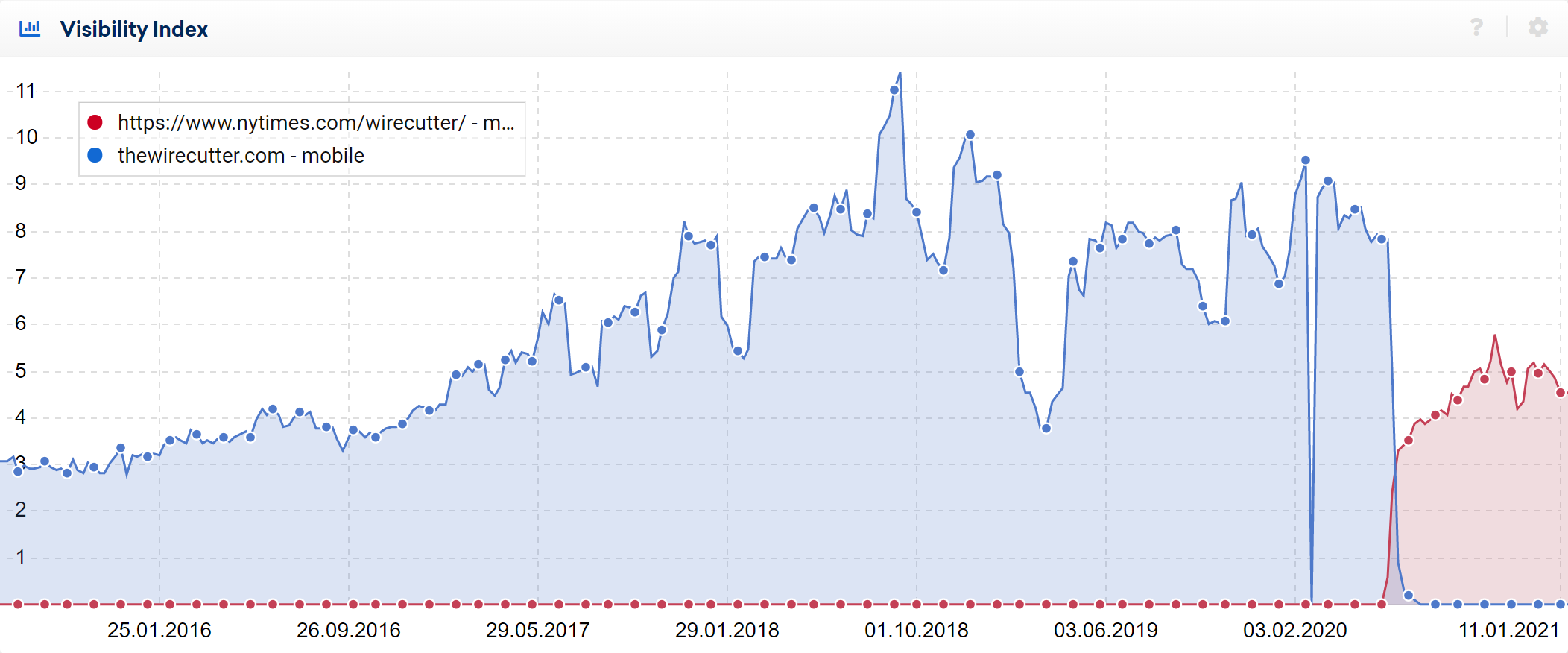
As detailed in the 2020 winners article, Good Housekeeping remains one of the most stable example of product review sites with affiliate links.
Amazon
The elephants in the digital high street took a huge hit during the December Core update this year and there can’t be many people feeling sorry that they’ve lost some of their domination.
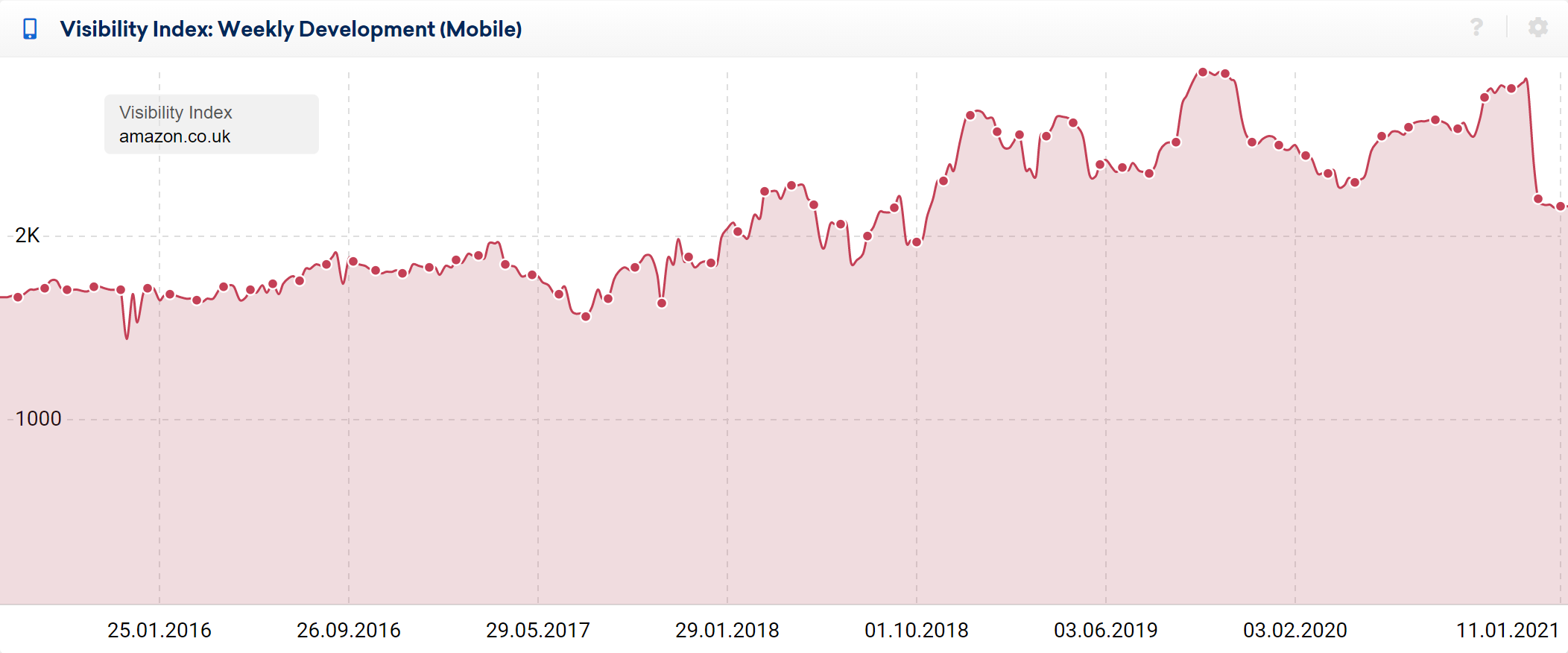
amazon.co.uk and amazon.com together gave up 489.8 VI points in December, removing gains made over the previous 2 years.
It’s the biggest e-commerce loss of the year by far but the huge footprint of the Amazon remains and the digital high street looks much the same as it did earlier in the year.
Rise and fall of the year
Apollo.io launched their CRM and outreach data tool in August 2019 but it appears they wanted Google to see some of the data for free. Starting from mid-November, Google ranked tens of thousands of URLs from their database of companies and names. Just weeks later, those rankings were gone, leaving the sort of visibility spike we usually only see when a domain is hacked.
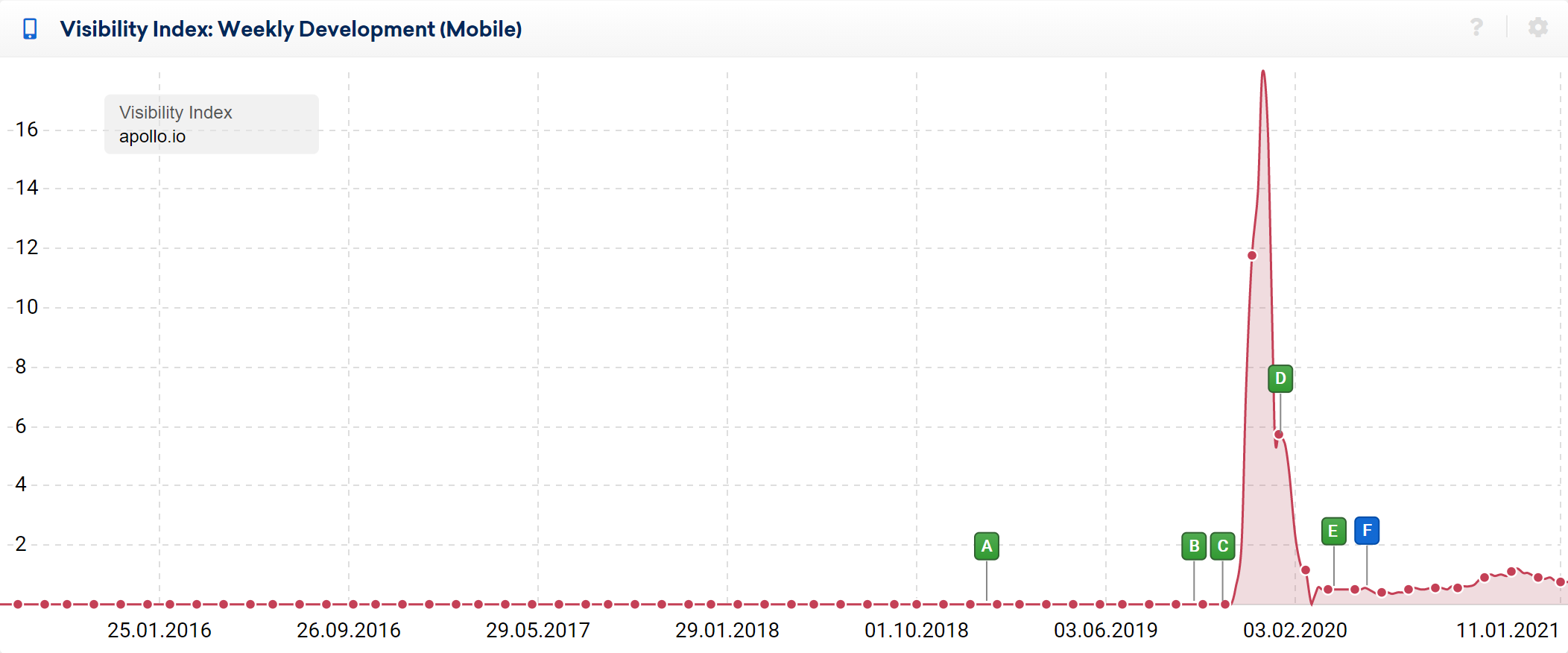
One can assume that most of the database was exposed to Google as today, there are still over 3.2 million pages in Google’s index. Google treated the content with some level of initial trust before, we assume, learning that the content had less value than originally thought.
The trust given by Google wasn’t full and unconditional though as you can see in this ranking distribution chart.
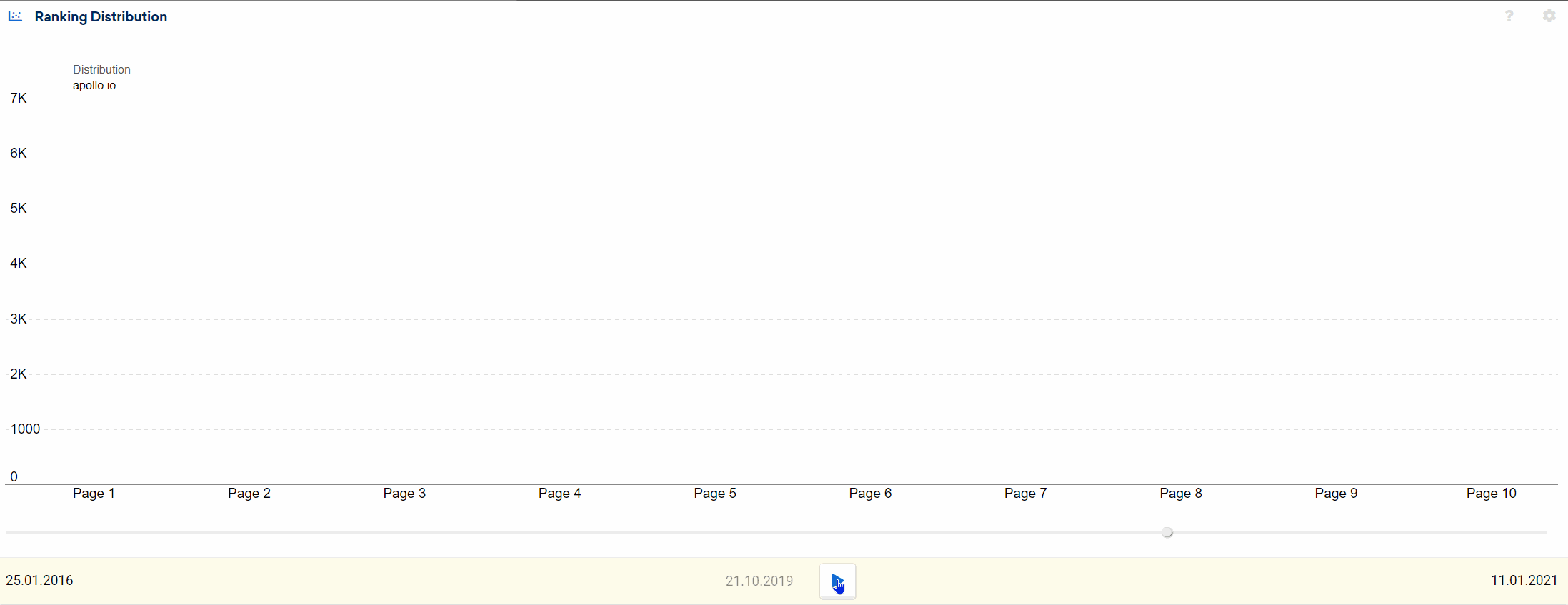
Page 1 rankings were won but the bulk of the content was buried much further down the search results. The 1500 URLs that gained page-1 status would have led to a Christmas surprise, that was taken away in January.
Ranking distribution is a useful indicator of SEO performance. The target is to get as many page 1 rankings as possible. Anything below that should be a work in progress. Apollo.io have a lot of work to do if they want to achieve SEO success.
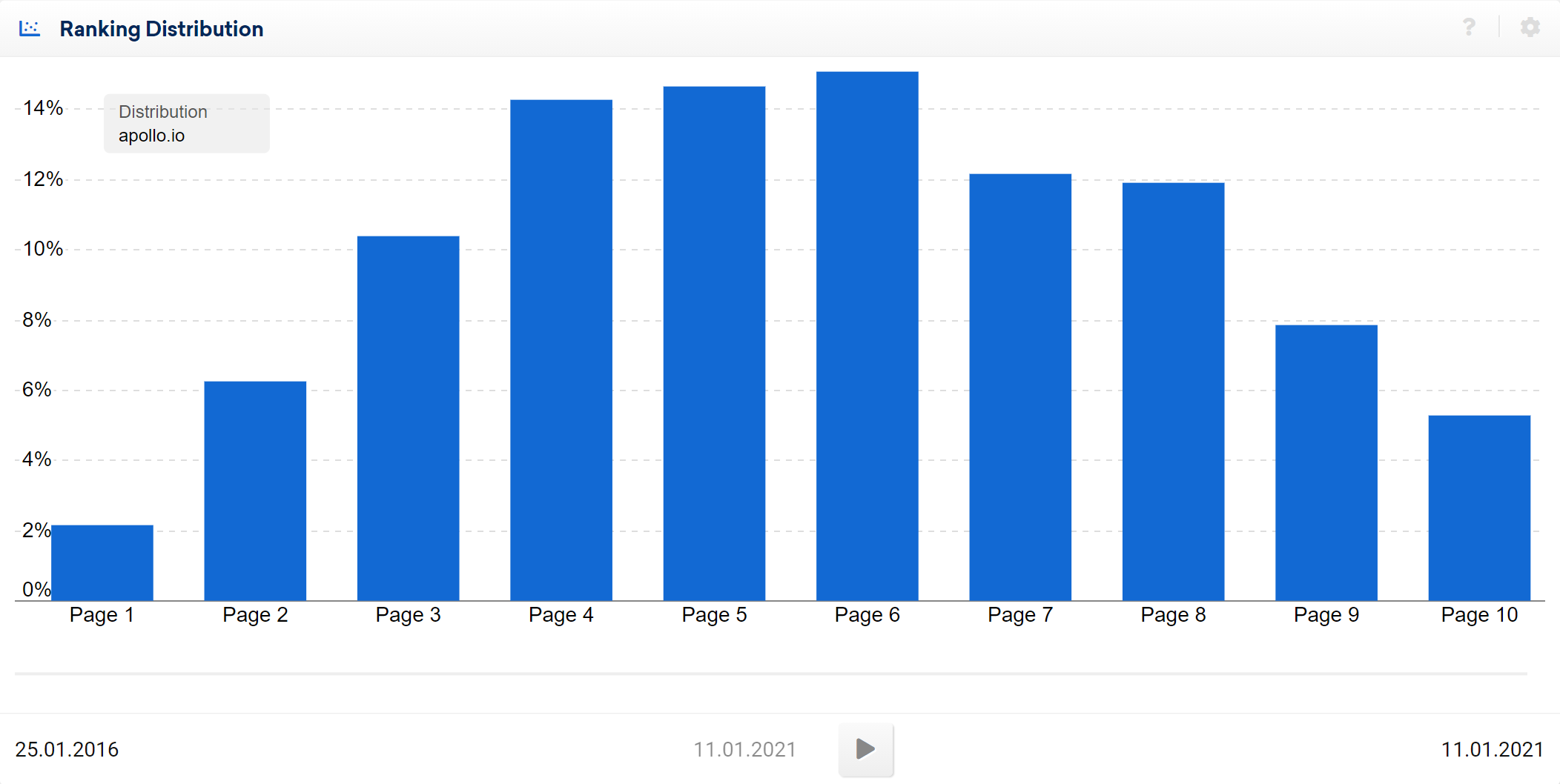
With only 2% of URLs ranking on page 1 from a list of 178000 that we have seen ranking in the Top 100, this is a poor SEO result. Compare it to the example we gave in the winners list where Fandom achieves a level of 22%. This is the sort of distribution curve you’re looking for:
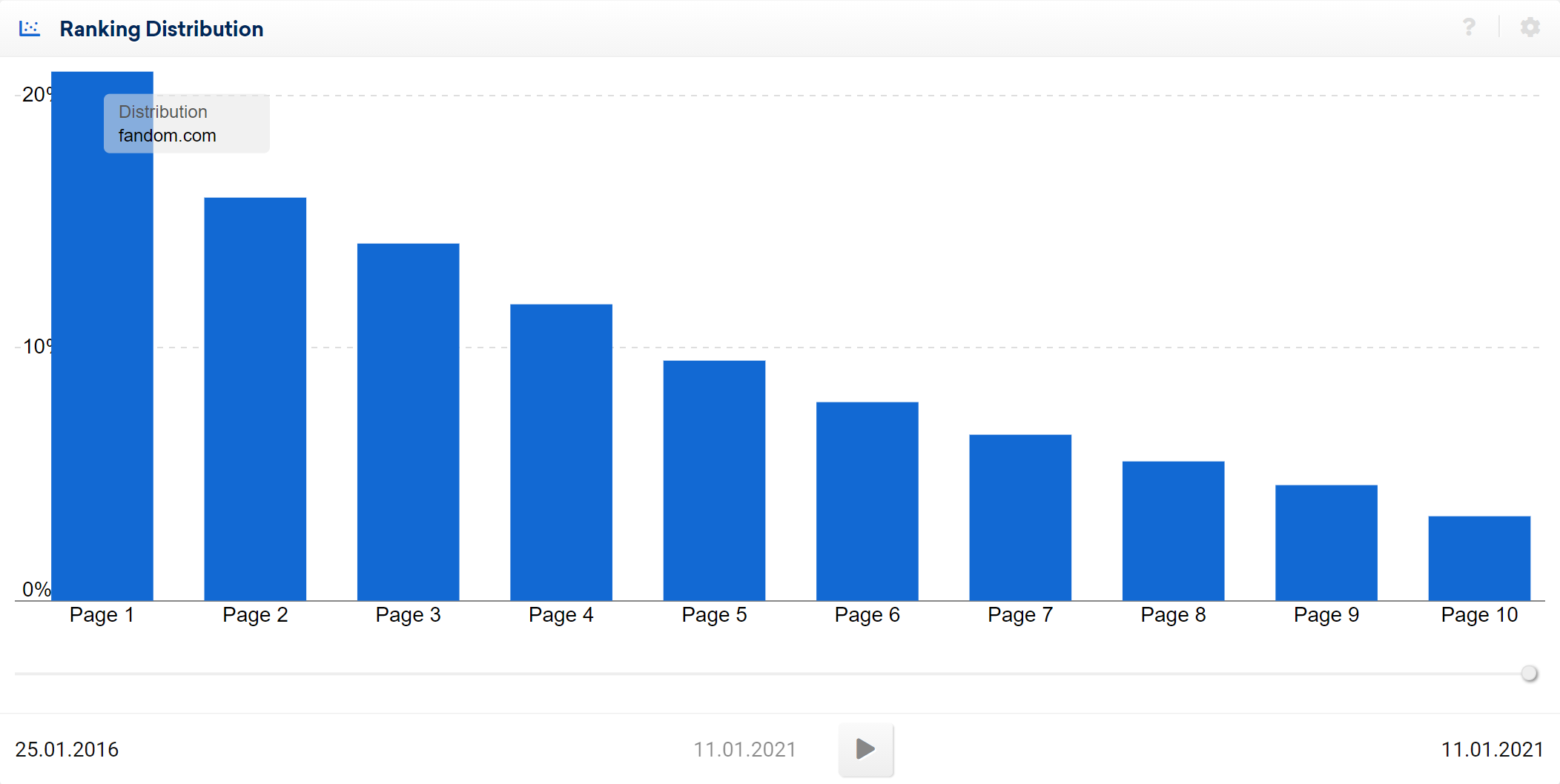
The sad story of closures
The year 2020 saw many struggles and for some businesses it was too much to carry. Statravel.co.uk, mysupermarket.co.uk and harveysfurniture.co.uk were three significant closures that remain idle. Other brands such as Laura Ashley and Mothercare are alive again, but need work.
According to reports, franchising of the Mothercare brand under the pharmacy Boots has recently started to roll-out but thousands of incoming links to Mothercare result in redirect loops and the rest are covered by a catch-all redirect.
The could be a result of the franchise model that Mothercare PLC is using. Given the performance shown below, one can deduce that Boots have not been given control of redirects under the mothercare.com domain, resulting in another big e-commerce drop of 2020.
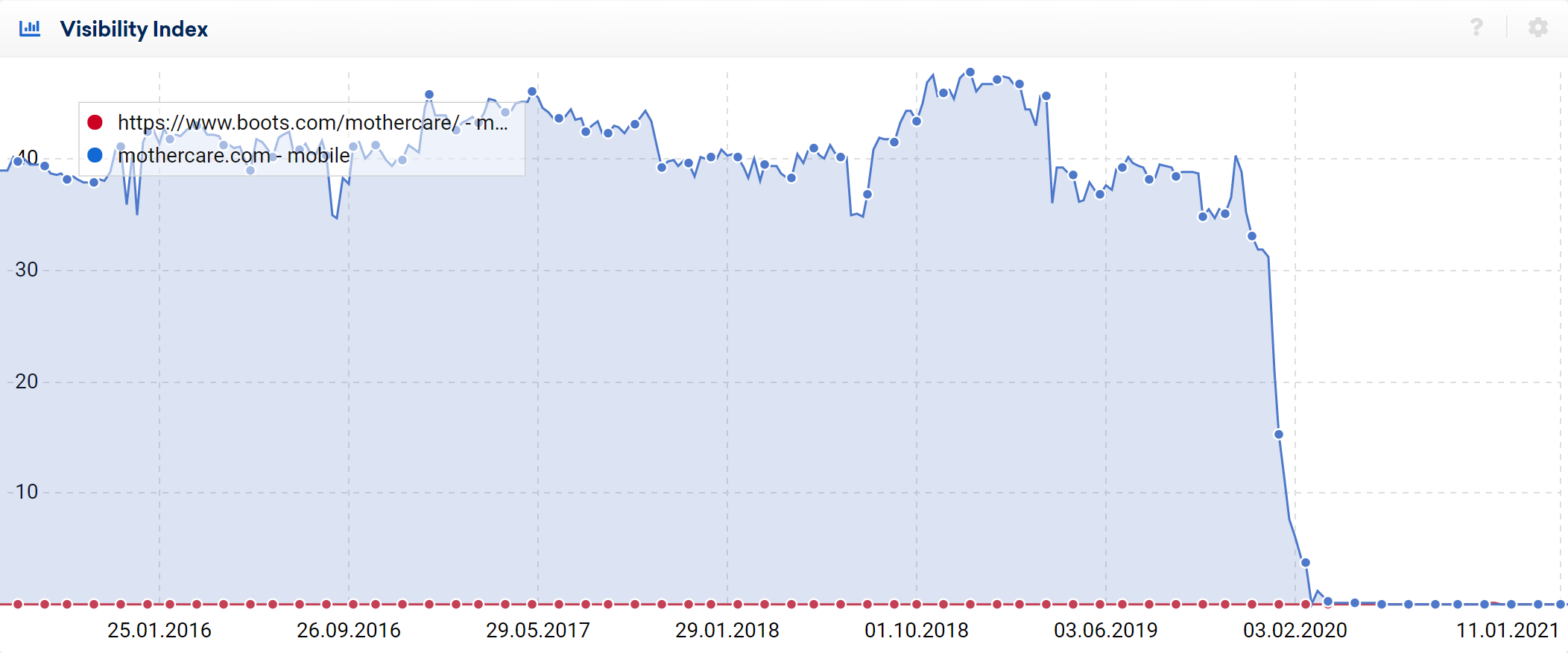
Full table: Losing domains by absolute and percentage values.
To find out more about the method used to determine these tables, please refer to the explanation in the IndexWatch 2020 Winners article.
For the list of strongest losses by percentage in 2020 we’ve used domains that ended the year with a Vi of more than 0.25. The other domains are mostly moves, closures and similar.
| Domain | 30.12.2019 | 28.12.2020 | Change |
|---|---|---|---|
| carbibles.com | 6.444 | 0.289 | 95.52% |
| apollo.io | 15.498 | 0.886 | 94.28% |
| banggood.com | 7.323 | 0.433 | 94.09% |
| bbfc.co.uk | 11.152 | 0.782 | 92.98% |
| eventbrite.com | 18.015 | 1.285 | 92.87% |
| rationalwiki.org | 8.853 | 0.644 | 92.73% |
| symantec.com | 5.067 | 0.431 | 91.49% |
| verizonwireless.com | 5.535 | 0.499 | 90.99% |
| paroles-musique.com | 4.878 | 0.496 | 89.83% |
| thedailybeast.com | 10.16 | 1.049 | 89.67% |
| diygarden.co.uk | 2.991 | 0.316 | 89.44% |
| virgintrains.co.uk | 2.336 | 0.252 | 89.21% |
| ukwebhostreview.com | 3.198 | 0.354 | 88.94% |
| catholicherald.co.uk | 2.521 | 0.289 | 88.54% |
| autozone.com | 2.442 | 0.281 | 88.51% |
| oyunlar1.com | 2.39 | 0.28 | 88.29% |
| songteksten.nl | 6.022 | 0.714 | 88.15% |
| britishskinfoundation.org.uk | 3.134 | 0.378 | 87.95% |
| ezvid.com | 7.209 | 0.905 | 87.45% |
| motoringresearch.com | 2.813 | 0.362 | 87.12% |
| whois.com | 2.086 | 0.276 | 86.76% |
| roblox.com | 4.476 | 0.604 | 86.52% |
| accessify.com | 3.694 | 0.522 | 85.87% |
| gemrockauctions.com | 2.935 | 0.431 | 85.30% |
| autoscout24.com | 3.844 | 0.568 | 85.22% |
The complete list of 250 domains (beware, includes adult-themed domains) is available in this Google Sheet.
Here’s the list of domains with the biggest absolute losses of Visibility index in 2020.
| Domain | 30.12.2019 | 28.12.2020 | Change |
|---|---|---|---|
| wikipedia.org | 7,260.95 | 6,226.46 | 1,034.49 |
| twitter.com | 1,061.06 | 347.77 | 713.298 |
| amazon.co.uk | 2,541.10 | 2,169.99 | 371.111 |
| theguardian.com | 742.17 | 439.75 | 302.422 |
| google.co.uk | 433.74 | 145.33 | 288.412 |
| wiktionary.org | 516.03 | 234.67 | 281.355 |
| bbc.co.uk | 600.01 | 409.15 | 190.86 |
| independent.co.uk | 297.66 | 149.08 | 148.577 |
| urbandictionary.com | 349.81 | 208.54 | 141.266 |
| amazon.com | 682.65 | 563.89 | 118.754 |
| gumtree.com | 211.74 | 96.04 | 115.699 |
| macmillandictionary.com | 200.34 | 92.66 | 107.682 |
| telegraph.co.uk | 200.38 | 96.27 | 104.107 |
| merriam-webster.com | 651.74 | 555.28 | 96.466 |
| spotify.com | 320.45 | 228.31 | 92.143 |
| cambridge.org | 798.25 | 708.93 | 89.316 |
| nytimes.com | 180.83 | 102.10 | 78.728 |
| genius.com | 284.86 | 207.15 | 77.707 |
| indeed.co.uk | 152.02 | 82.11 | 69.906 |
| ldoceonline.com | 114.82 | 48.16 | 66.659 |
| dailymail.co.uk | 162.11 | 98.23 | 63.877 |
| companieshouse.gov.uk | 70.34 | 12.04 | 58.293 |
| webmd.com | 276.12 | 219.27 | 56.842 |
| thesun.co.uk | 158.63 | 103.18 | 55.448 |
| medicalnewstoday.com | 188.86 | 138.56 | 50.3 |
An unfiltered list, including domains with adult themes, is also available in a Google Sheet.
Conclusion
2020 was exciting – not only because of external influences, a lot has happened in the Google search results too, in this remarkable year.
Google has largely remained true to its credo of the last few years: the search intention of the user determines the composition of the search results, so good offerings win.
The fact that Google tries to show only objectively correct search results in sensitive areas is to be welcomed. How far this mammoth task will succeed remains to be seen.
In the coming year, Google can be sure of increased attention from the competition authorities (especially in the USA): Google has to defend itself in almost every commercially relevant vertical.


